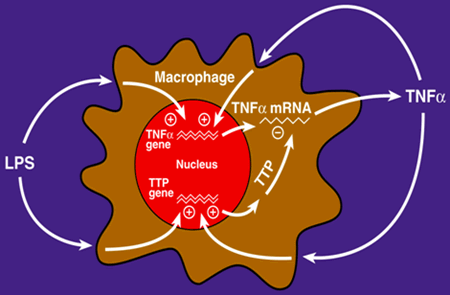Molecular & Cellular Biology Laboratory

Perry J. Blackshear, M.D., D.Phil.
Research Summary
Perry J. Blackshear, M.D., D.Phil., is head of the Post-Transcriptional Gene Expression Group and holds a secondary appointment in the NIEHS Immunity, Inflammation, and Disease Laboratory. He also holds secondary appointments in the Departments of Biochemistry and Medicine at Duke University. His group studies the roles of a small family of CCCH tandem zinc finger proteins, exemplified by tristetraprolin or TTP, in the physiological regulation of mRNA turnover and translation. Members of this family of proteins exist in essentially all eukaryotes, from plants to humans, and are important in species-specific control of mRNA turnover, in some cases in response to environmental cues. Methods used in this research range from structural biology and enzyme kinetics to mouse, human and yeast genetics.

The Post-transcriptional Gene Expression Group is interested in the molecular mechanisms by which proteins of this family are regulated, and in their physiological roles in a variety of normal processes, including innate immunity in response to environmental cues, hematopoiesis, establishment of the fetal circulation, and placental physiology in mammals. Research is also conducted in model organisms that express single members of the family, including Schizosaccharomyces pombe and the common human pathogen Candida albicans.
Major areas of research:
- Molecular and biochemical mechanisms of regulation of proteins within a small family of CCCH tandem zinc finger proteins, and their roles in mRNA turnover.
- Physiological roles of these proteins in the regulation of gene expression, in organisms ranging from yeasts to man, under normal circumstances and in response to environmental cues.
Current projects:
- Mechanisms of regulation of TTP family proteins in mRNA binding and promotion of mRNA deadenylation.
- Physiological roles of these proteins in controlling gene expression in intact organisms.
Blackshear received his Doctor of Philosophy degree from Oxford University in 1974, and his M.D. from Harvard Medical School in 1977. He has published more than 290 peer-reviewed articles in leading biomedical journals, as well as many book chapters. He served as an Investigator with the Howard Hughes Medical Institute at Duke University, where he was also a Professor of Medicine and of Biochemistry, before joining NIEHS in 1997. Blackshear served as Deputy Chief of the Signal Transduction Laboratory from 2016 to 2019.


